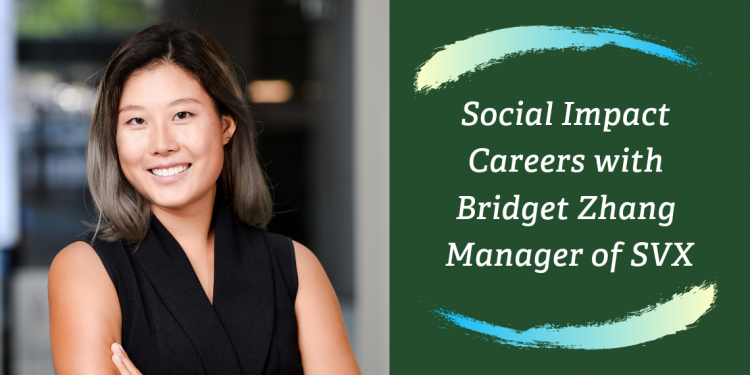Building your social impact career. An interview with Bridget Zhang, Manager of SVX
Bridget Zhang is a Manager at SVX (Social Venture Connexion), a financial services firm that designs strategies, builds products, and raises capital for impact organizations. SVX was incubated at MaRS Discovery District and became an independent entity in 2019. We had the chance to speak with Bridget about her experience, how she got to where she is today and her advice for others interested in social impact careers.
What best defines you?
I hear from my friends, parents, and my partner that I am a very inquisitive person. I love asking questions, especially when I meet new people. I would also describe myself as someone who doesn’t take things or myself too seriously and will be ready with an easy laugh.
Can you briefly describe your job in a nutshell?
SVX is a non-profit startup. When I started in my role as an Analyst, I continued building out the impact issuer community by working with social enterprises to create investable financial products. Now that I have moved into a Manager position, I’ve been focused on building the investor community as well. My job is to identify what the social innovation market needs, and build new products and ecosystem infrastructure accordingly. For example, this might be fund design for place-based investing, or developing strategic partnerships to collaborate and lean on others to achieve a collective goal. My role also involves putting on an operations and business development hat to ensure that SVX continues to be sustainable and scalable in the market.
When did you know you wanted to work in social impact/impact investing?
When I was in school, it felt like there were two career options in front of me. The first was in corporate social responsibility (CSR) and nonprofit world, and the second was a finite group of jobs in consulting or capital markets. It wasn’t until a friend recommended the book The Blue Sweater to me that I realized there was a middle-ground that existed between them. Impact investing had the mission of achieving the lofty goals of CSR, but with a model that aligned the motivations of all stakeholders in such a way that it wasn’t about how we can do something for three or six months or a year, but how we can build for the long term. I would say this was my turning point.
In 2012, there had been enough activity in the social innovation industry that I had some resources to sink my teeth into. I began by doing groundwork research and getting my bearings on who the players are and what this industry is all about. I discovered publications from the Rockefeller Foundation (one of the first institutions to champion the concept of impact investing), looked into Social Finance UK (the pioneers of the first Social Impact Bonds), read whitepapers, and slowly the opportunities and challenges of social finance began to emerge.
However, doing a scan of the job market, there weren’t a ton of roles available in impact at the time. The MaRS Centre for Impact Investing existed, but they were looking for individuals who had 5-7 years of experience. So, once I completed my degree, I did equity research at an investment bank. There, I earned an understanding of due diligence processes and institutional investor strategy, and gained a technical skill set that I was eventually able to market to SVX. Although the companies I worked with didn’t excite me in the same way that social enterprises do, I gained extremely valuable experience and accelerated my learning.
What would you say to a new graduate, or someone looking to break into impact investing?
Today there are many more players in the social impact space. For example, Social Innovation Generation (SIG) seeded the first group of intermediaries like MaRS and the Centre for Social Innovation (CSI). They went on to initiate organizations like SVX, and now, we are seeding partner groups like VERGE Capital, Esplanade, and the Upper Canada Equity Fund. I believe the market is at a place where you can go straight into impact investing, and don’t necessarily need to take a round-about path to get there. However, you’ll have to arm yourself with the knowledge of what’s been happening in the area of impact investing that you’re concerned with. For example, if you’re interested in dealing with institutional investors and fossil-free funds, a firm like Genus might be right for you. If that’s the case, put yourself in the shoes of a current employee there and think about what their next strategy discussion point would be. Preemptively develop your perspective for where the organization and market needs to go. And of course, read whitepapers, go to industry events, and get a sense for what all the players do – a lot of it is exposure!
What advice do you have for anyone that wants to work in a socially impactful job abroad, or is just looking to travelling ethically?
Over the course of my career, I’ve lived in Egypt, Nicaragua, and China for varying periods of time. I’ve also been fortunate enough to travel to a few countries for leisure as well. Here’s my advice:
- Actively make friends with people of that country or community (don’t stick to only befriending expats!) I believe you haven’t truly lived in that country unless you’ve developed meaningful relationships with local people. The richness of your experience will come from that.
- Be a listener. It’s easy for those coming from a more developed area or economy to prescribe solutions for communities that were fitted for a different era and a different set of circumstances. If you’re not listening, it’s very hard to understand what their actual reality is. Approach your interactions with humility, and on a learning basis.
- Be mindful of what groups are potentially being exploited in your activities, both directly and indirectly. In places like South East Asia and Central America, there is a prevalent party traveler culture. Before you engage in your activities, question whether that activity is the right way to be in someone else’s space. The world is not your playground! When you go into a community, ask yourself what your actions mean for the people who are from there.
What books would you recommend?
Better than Before by Gretchen Rubin and A Fine Balance by Rohinton Mistry.
What is your greatest productivity tip?
If you need to write but you’re not in the mood to do it, turn off your monitor and write with a blank screen. Type what you’re thinking without seeing what you’re putting on the page, then go back and pick out what is useful.
Want more curated content delivered straight to your inbox?






No Comment